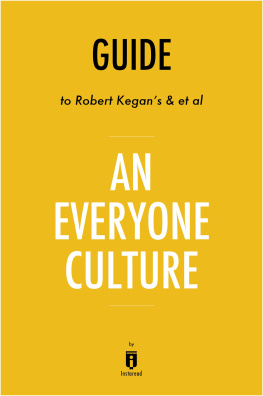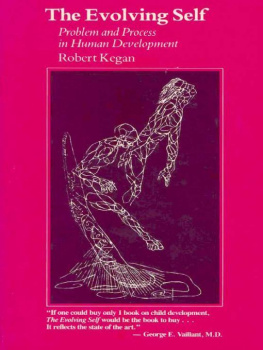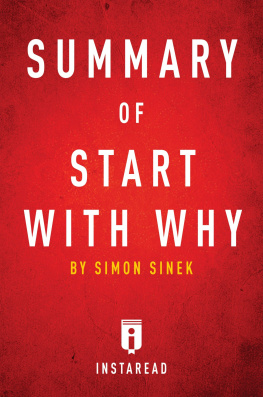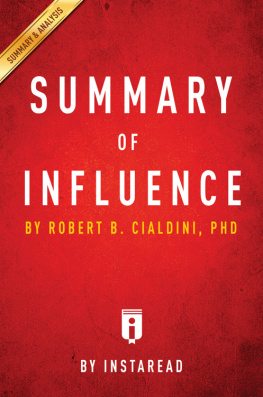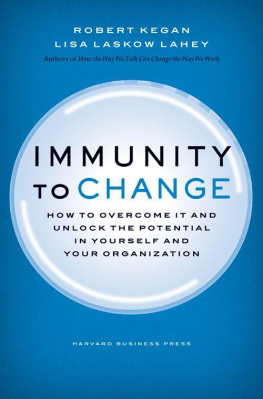Guide to
Robert Kegans & et al
An Everyone Culture
Becoming a Deliberately Developmental Organization
by
Instaread
Please Note
This is a companion to the original book.
Copyright 2016 by Instaread. All rights reserved worldwide. No part of this publication may be reproduced or transmitted in any form without the prior written consent of the publisher.
Limit of Liability/Disclaimer of Warranty: The publisher and author make no representations or warranties with respect to the accuracy or completeness of these contents and disclaim all warranties such as warranties of fitness for a particular purpose. The author or publisher is not liable for any damages whatsoever. The fact that an individual or organization is referred to in this document as a citation or source of information does not imply that the author or publisher endorses the information that the individual or organization provided. This concise companion is unofficial and is not authorized, approved, licensed, or endorsed by the original books author or publisher.
Table of Contents
Overview
An Everyone Culture by Robert Kegan, Lisa Lahey, Matthew Miller, Andy Fleming, and Deborah Helsing is an academic description of unconventional employee management systems implemented by three example businesses. Cinema chain ArcLight Cinemas, investment firm Bridgewater Associates, and corporate rewards company Next Jump each exemplify the deliberately developmental organization, or DDO.
In conventional organizations, employees spend time that could be productive covering up mistakes or hiding weaknesses from coworkers. In a DDO, the company reinvests that time in activities that help its employees learn from their mistakes, build on their shortcomings, and constantly challenge their weaknesses.
DDOs rely on the idea that adults continue to develop mentally well beyond physical maturity. The three features of a DDO are the constant pressure to learn new skills, a trusting environment where people accept and give feedback, and consistent practices that strengthen both of the first two features. These three features are known respectively as the edge, home, and groove, and they consist of many other characteristics and practices, such as transparency, the ability to criticize people higher up in the organization, and moving employees into new roles as soon as they are comfortable in their current roles.
The three DDOs in this study attribute their success to a company culture that is attentive to employees at all levels. Companies that implement DDO processes into their culture from the top down or from the middle layers out still gain some benefits from implementing developmental practices as long as early adopters commit completely to the developmental focus. An organization can assess its progress with DDO process implementation by asking employees about their comfort in the environment and their progress on the path of personal development.
Important People
Robert Kegan is a professor specializing in adult learning and professional development at Harvard Universitys Graduate School of Education. He has co-written several books about adult development.
Lisa Lahey is a Harvard University faculty member who has co-written books about adult development and founded a leadership training firm.
Matthew Miller is an associate dean and lecturer at Harvard Universitys Graduate School of Education.
Andy Fleming is the chief executive officer and founder of an employee development research and consulting firm.
Deborah Helsing lectures at Harvard Universitys Graduate School of Education and directs training at an employee development firm.
Ray Dalio founded the investment firm Bridgewater Associates. He ranks on lists of the most influential people in business and the richest people in the world.
Nora Dashwood is the chief operating officer of ArcLight Cinemas Company, a subsidiary of Decurion Corporation.
Nayan Busa is a software engineering manager at Next Jump, a coupon and rewards marketing company.
Jeff Koblentz is the chief financial officer of Decurion Corporation, the chief operating officer of Decurion Management Company, and president of the Robertson Properties Group at Decurion.
Key Insights
- In a conventional business culture, employees spend a large portion of their time hiding their weaknesses and covering up their mistakes.
- In a deliberately developmental organization, employees are encouraged to learn from their mistakes, push each other toward improvement, and challenge each other to move past their comfort areas.
- Contrary to previous assumptions about human development, psychologists recognize that people can continue to develop in adulthood. Adults may exist on one of three plateaus of capabilities for change and information processing.
- A DDO involves a trusting environment where employees feel secure giving and receiving feedback, encourage one anothers development, and have consistent practices that collect data and build community strength.
- Many DDO practices allow employees an unusually high amount of visibility into company decision-making and employee evaluation.
- DDOs encourage all employees to provide feedback to all other employees, including feedback on people who outrank them. All feedback must be seriously considered.
- DDOs push individuals into new roles and encourage them to master a new job as soon as they become competent in their current roles or jobs.
- The characteristics of a DDO cannot be added to a conventional organization. A successful DDO is one built based on experimentation and with complete commitment from every level of the organization.
- The practices that allow DDOs to reinforce their developmental goals and build their safe communities include tools that allow employees to collect and share data on each others performance as well as regular mandatory social interactions.
- Individual change toward DDO practices can occur by evaluating the obstacles and assumptions preventing someone from accomplishing a goal. Organizational change involves implementing customized programs to introduce DDO practices along with regular progress assessments.
Analysis
Key Insight 1
In a conventional business culture, employees spend a large portion of their time hiding their weaknesses and covering up their mistakes.
Analysis
In most organizations, employees do not see their mistakes or weaknesses as learning experiences. They invest so much time in covering up errors and flaws that it reduces the organizations productivity, as if everyone were working another job at the same time. They tend to make the same mistake repeatedly because they are not encouraged to spend time probing the causes of those mistakes.
The management structure of the typical organization today resembles the structure originally developed in response to the Industrial Revolution, as General Stanley McChrystal describes it in his 2015 book Team of Teams. He writes that before the Industrial Revolution, individuals developed the skills needed to craft an item from beginning to end, so every employee was an expert and there was little need for management. After the Industrial Revolution began, employees were given narrower tasks for which they did not need deep expertise, and the manager's role was to see the big picture on their behalf. Today, company employees are generally not responsible for making plans that involve the bigger picture beyond their departments, and they cannot scrutinize their supervisors plans. [1] In this framework, the personal development of every employee would not seem valuable to the larger organization.
Key Insight 2
Next page
